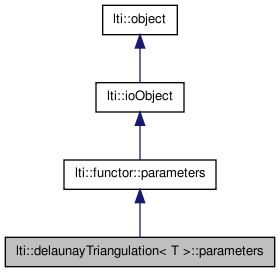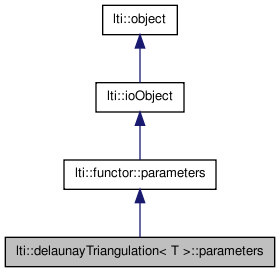

|
latest version v1.9 - last update 10 Apr 2010 |
|
the parameters for the class delaunayTriangulation More...
#include <ltiDelaunayTriangulation.h>


Public Member Functions | |
| parameters () | |
| parameters (const parameters &other) | |
| ~parameters () | |
| const char * | getTypeName () const |
| parameters & | copy (const parameters &other) |
| parameters & | operator= (const parameters &other) |
| virtual functor::parameters * | clone () const |
| virtual bool | write (ioHandler &handler, const bool complete=true) const |
| virtual bool | read (ioHandler &handler, const bool complete=true) |
Public Attributes | |
| float | specialPointsFactor |
| float | epsilon |
the parameters for the class delaunayTriangulation
| lti::delaunayTriangulation< T >::parameters::parameters | ( | void | ) | [inline] |
default constructor
Reimplemented from lti::functor::parameters.
References lti::delaunayTriangulation< T >::parameters::epsilon, and lti::delaunayTriangulation< T >::parameters::specialPointsFactor.
Referenced by lti::delaunayTriangulation< T >::parameters::clone().
| lti::delaunayTriangulation< T >::parameters::parameters | ( | const parameters & | other | ) | [inline] |
copy constructor
| other | the parameters object to be copied |
References lti::delaunayTriangulation< T >::parameters::copy().
| lti::delaunayTriangulation< T >::parameters::~parameters | ( | ) | [inline, virtual] |
destructor
Reimplemented from lti::functor::parameters.
| virtual functor::parameters* lti::delaunayTriangulation< T >::parameters::clone | ( | ) | const [inline, virtual] |
returns a pointer to a clone of the parameters
Implements lti::functor::parameters.
References lti::delaunayTriangulation< T >::parameters::parameters().
| parameters& lti::delaunayTriangulation< T >::parameters::copy | ( | const parameters & | other | ) | [inline] |
copy the contents of a parameters object
| other | the parameters object to be copied |
References lti::functor::parameters::copy(), lti::delaunayTriangulation< T >::parameters::epsilon, and lti::delaunayTriangulation< T >::parameters::specialPointsFactor.
Referenced by lti::delaunayTriangulation< T >::parameters::operator=(), and lti::delaunayTriangulation< T >::parameters::parameters().
| const char* lti::delaunayTriangulation< T >::parameters::getTypeName | ( | void | ) | const [inline, virtual] |
returns name of this type
Reimplemented from lti::functor::parameters.
| parameters& lti::delaunayTriangulation< T >::parameters::operator= | ( | const parameters & | other | ) | [inline] |
copy the contents of a parameters object
| other | the parameters object to be copied |
References lti::delaunayTriangulation< T >::parameters::copy().
| virtual bool lti::delaunayTriangulation< T >::parameters::read | ( | ioHandler & | handler, | |
| const bool | complete = true | |||
| ) | [inline, virtual] |
read the parameters from the given ioHandler
| handler | the ioHandler to be used | |
| complete | if true (the default) the enclosing begin/end will be also written, otherwise only the data block will be written. |
Reimplemented from lti::functor::parameters.
References lti::delaunayTriangulation< T >::parameters::epsilon, lti::ioHandler::readBegin(), lti::ioHandler::readEnd(), and lti::delaunayTriangulation< T >::parameters::specialPointsFactor.
| virtual bool lti::delaunayTriangulation< T >::parameters::write | ( | ioHandler & | handler, | |
| const bool | complete = true | |||
| ) | const [inline, virtual] |
write the parameters in the given ioHandler
| handler | the ioHandler to be used | |
| complete | if true (the default) the enclosing begin/end will be also written, otherwise only the data block will be written. |
Reimplemented from lti::functor::parameters.
References lti::delaunayTriangulation< T >::parameters::epsilon, lti::delaunayTriangulation< T >::parameters::specialPointsFactor, lti::ioHandler::writeBegin(), and lti::ioHandler::writeEnd().
| float lti::delaunayTriangulation< T >::parameters::epsilon |
This value is used for determining when a point falls on an edge.
Thus the construction of the triangulation can be influenced quite strongly by this value.
Note that the values depends on the given data.
Default: 0.001. Works well for pixel position ranges
Referenced by lti::delaunayTriangulation< T >::parameters::copy(), lti::delaunayTriangulation< T >::parameters::parameters(), lti::delaunayTriangulation< T >::parameters::read(), and lti::delaunayTriangulation< T >::parameters::write().
| float lti::delaunayTriangulation< T >::parameters::specialPointsFactor |
The algorithm uses a virtual triangle consisting of three special points.
It must at least include all given points. However, the distance of these points from the actual points influences the bahaviour of the algorithm with respect to small dents in the convex hull.
A large value will give you the complete, correct Delaunay triangulation. A small value excludes triangles that share one edge with the convex hull and have a 'large' angle opposite that edge. This behavior can be useful in some applications where 'degenerate' triangles are not useful.
Default: 100. Gives the correct result for most applications
Referenced by lti::delaunayTriangulation< T >::parameters::copy(), lti::delaunayTriangulation< T >::parameters::parameters(), lti::delaunayTriangulation< T >::parameters::read(), and lti::delaunayTriangulation< T >::parameters::write().